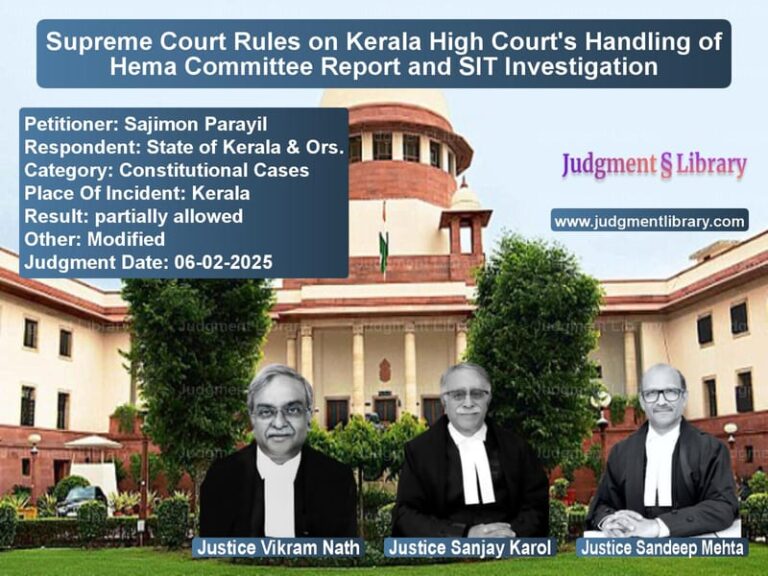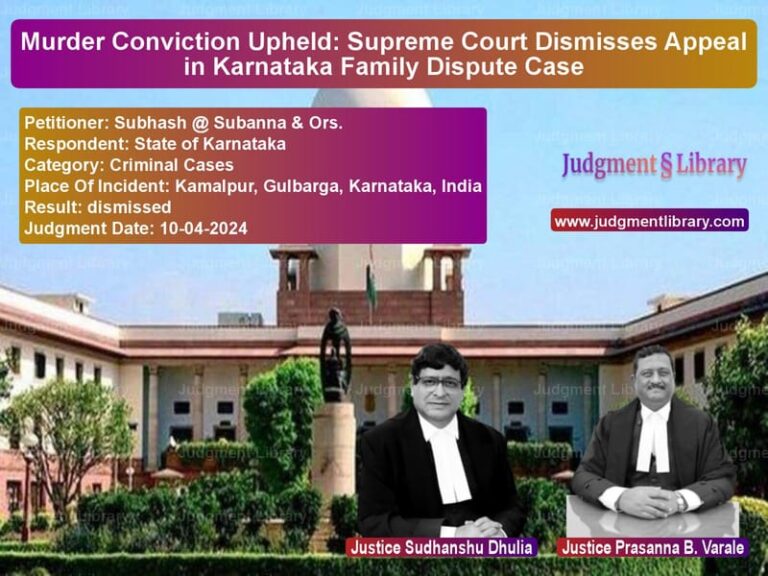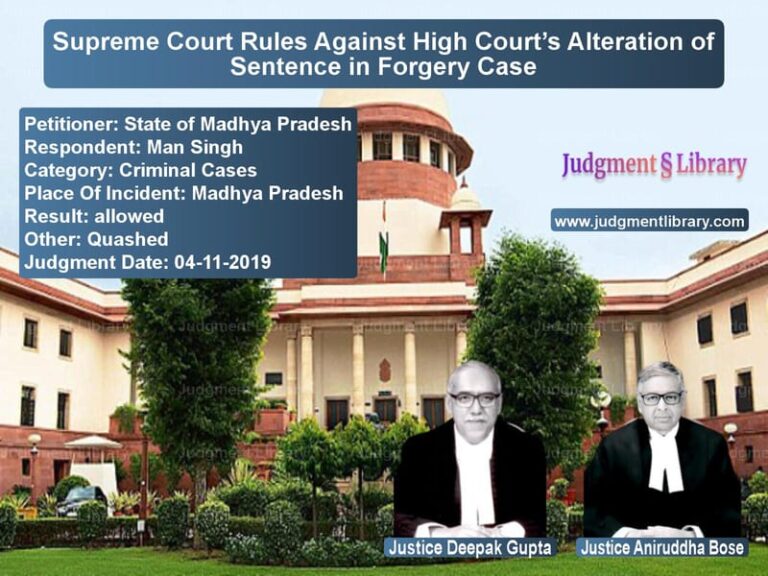Supreme Court Rules on Army Promotion Dispute: Fair Selection Process Upheld
The Supreme Court of India, in its judgment dated August 1, 2018, ruled on an important case involving a senior-ranking officer’s promotion in the Army Medical Corps. The case, Union of India vs. Maj. Gen. Manomoy Ganguly, revolved around the officer’s claims for promotion to the post of Director General Medical Services (Army) [DGMS (Army)], which had been denied to him despite a favorable ruling from the Armed Forces Tribunal (AFT). The Supreme Court reviewed the validity of the promotion process, ensuring that the criteria of ‘inter se seniority and suitability’ were properly applied.
The judgment underscores the importance of objective evaluation in military promotions and clarifies the legal interpretation of suitability versus seniority in the selection process for high-ranking posts in the armed forces.
Background of the Case
Maj. Gen. Manomoy Ganguly was commissioned in the Army Medical Corps on March 3, 1980. Over the years, he ascended the ranks and reached the position of Lieutenant General. However, his journey to this rank was filled with legal challenges, as he had to fight for his rightful promotion from Major General to Lieutenant General.
Despite his promotion, he was overlooked for the position of DGMS (Army), which led him to approach the AFT. The AFT ruled in his favor and directed the Union of India to appoint him to the post. The Union of India challenged this ruling before the Supreme Court, arguing that the selection process had been conducted fairly and in accordance with established criteria.
Petitioner’s Arguments
The Union of India, representing the military authorities, contended that:
- The AFT erred in directing Maj. Gen. Ganguly’s appointment as DGMS (Army) without allowing the government to assess his suitability for the role.
- The selection process was based on the criteria of ‘inter se seniority and suitability,’ and suitability was an essential factor that could override seniority.
- Maj. Gen. Ganguly had not been found suitable for the role, and Lt. Gen. Sanjiv Chopra was selected instead based on a comparative assessment of suitability.
- The military has the discretion to choose the most suitable officer for the post, considering leadership qualities, operational experience, and administrative capabilities.
Respondent’s Arguments
Maj. Gen. Ganguly’s legal team argued that:
- He was the senior-most officer eligible for the position of DGMS (Army), and under normal circumstances, the senior-most candidate should be appointed unless declared unfit.
- The authorities had acted arbitrarily by ignoring his seniority and selecting a junior officer.
- The AFT had correctly ruled in his favor after finding procedural lapses in the promotion process.
- The government’s decision was influenced by bias, as evidenced by the fact that he had earlier been unfairly denied promotion to Lieutenant General.
Supreme Court’s Observations
After carefully reviewing the case, the Supreme Court ruled that the selection process for DGMS (Army) was not solely based on seniority but also involved an assessment of suitability. The Court clarified:
“The criteria laid down for selection include both inter se seniority and suitability. Suitability involves a comparison of candidates based on their service records, leadership experience, and ability to perform in the role.”
The Court observed that the phrase ‘inter se seniority and suitability’ implies that seniority is not the only determining factor. Instead, a comparative assessment of candidates’ qualifications, experience, and leadership qualities must be considered. The Court stated:
“Seniority provides a basis for eligibility, but suitability determines the final selection. The selection authority has the discretion to appoint the most suitable officer, provided the assessment is conducted fairly and transparently.”
Final Verdict
The Supreme Court modified the AFT’s ruling and remitted the case back to the Raksha Mantri (Defence Minister) for reconsideration. The Court directed that:
- The matter be reviewed objectively, ensuring that all relevant factors, including suitability and seniority, are fairly assessed.
- The government should not automatically appoint Maj. Gen. Ganguly but should conduct a fresh evaluation based on established criteria.
- The process should be completed within a specified timeframe to avoid unnecessary delays.
Conclusion
The judgment in Union of India vs. Maj. Gen. Manomoy Ganguly clarifies the distinction between seniority and suitability in military promotions. It reaffirms the principle that while seniority is important, it does not guarantee selection for leadership positions. Instead, a holistic assessment of an officer’s capabilities is necessary.
This ruling serves as an important precedent for military and civil service promotions, ensuring that appointments to high-ranking positions are based on merit and suitability rather than seniority alone.
Petitioner Name: Union of India.Respondent Name: Maj. Gen. Manomoy Ganguly.Judgment By: Justice A.K. Sikri, Justice Ashok Bhushan.Place Of Incident: New Delhi, India.Judgment Date: 01-08-2018.
Don’t miss out on the full details! Download the complete judgment in PDF format below and gain valuable insights instantly!
Download Judgment: Union of India vs Maj. Gen. Manomoy Ga Supreme Court of India Judgment Dated 01-08-2018.pdf
Direct Downlaod Judgment: Direct downlaod this Judgment
See all petitions in Promotion Cases
See all petitions in Public Sector Employees
See all petitions in Recruitment Policies
See all petitions in Judgment by A.K. Sikri
See all petitions in Judgment by Ashok Bhushan
See all petitions in partially allowed
See all petitions in Remanded
See all petitions in supreme court of India judgments August 2018
See all petitions in 2018 judgments
See all posts in Service Matters Category
See all allowed petitions in Service Matters Category
See all Dismissed petitions in Service Matters Category
See all partially allowed petitions in Service Matters Category







